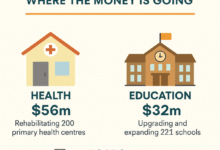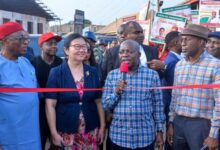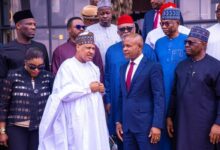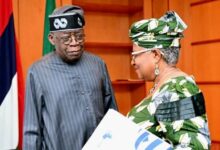Monetary Rates: MPC Maintains Status Quo By Ray Echebiri
True to predictions by some Economists, the Central Bank of Nigeria (CBN) Monetary Policy Committee (MPC) which met for two days (March 23 & 24) in Abuja left the monetary rates unchanged.
In a communiqué read out at the end of the two-day meeting by the governor, Mr. Godwin Emefiele, the MPC said its previous decisions needed time for their effects to fully permeate the economy and therefore, voted to maintain the current position. All eleven members of the committee voted to retain the Monetary Policy Rate (MPR) at 13 per cent; retain the CRR on Private Sector deposits at 20 per cent; retain CRR on Public Sector deposits at 75 per cent; and retain the liquidity ratio at 30 per cent.
Before reaching these decisions, the MPC had thoroughly reviewed developments in the external economic scene and on the domestic front. It expressed concern about the moderate and uneven recovery of the global economy and its impact on emerging economies including Nigeria’s. It noted in particular that lower commodity prices were weighing heavily on output growth, especially in the oil exporting countries. It is worried that expectations of a rise in US short-term interest rates is fuelling capital outflows and currency weaknesses in the emerging markets and developing countries.
The Committee also noted with concern, the gradual increase in the year-on-year headline inflation during the first two months of the year from 8.0 per cent in December 2014 to 8.2 per cent in January and further to 8.4 per cent in February 2015. According to it, the underlying inflationary pressures came largely from food (particularly imported food) and the core components. Food inflation rose from 9.2 per cent in December 2014 to 9.4 per cent in February 2015 while core inflation increased from 6.2 to 7.0 per cent during the same period. The major risks to inflation, the Committee noted, include elevated aggregate spending in the run up to the 2015 general elections, the likely higher import prices on the strength of an appreciating dollar and possible food supply shocks linked to insurgency and insecurity in some major agricultural zones of the country.
The Committee, however, expressed satisfaction with the impact of the decisions taken to harmonise the foreign exchange market. According to it, as a consequence of those actions, the interbank exchange rate has stabilized after an initial adjustment. But it expressed concern about the wide divergence between the interbank and the bureau-de-change exchange rates, which provides an avenue for arbitrage and speculative activities in the market. It noted with concern the phenomenon of currency substitution and partial dollarization in the economy, a development which it said may have significantly fuelled the high demand for foreign exchange. The Committee, therefore, reiterated that the naira remained the currency of transaction in the economy and advised the CBN to take all possible measures to address this development.
The Committee also expressed concern about the outlook for growth, which had moderated partly due to the effects of low oil prices, naira exchange rate depreciation, and election-related concerns. It was however, optimistic that the situation would improve once elections were successfully conducted with the expected improvement in business confidence.












